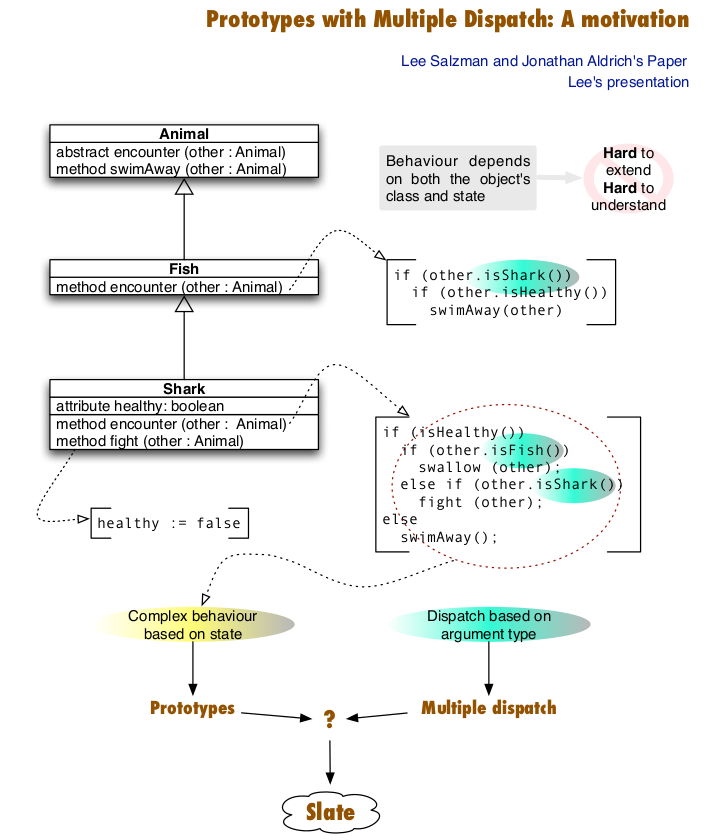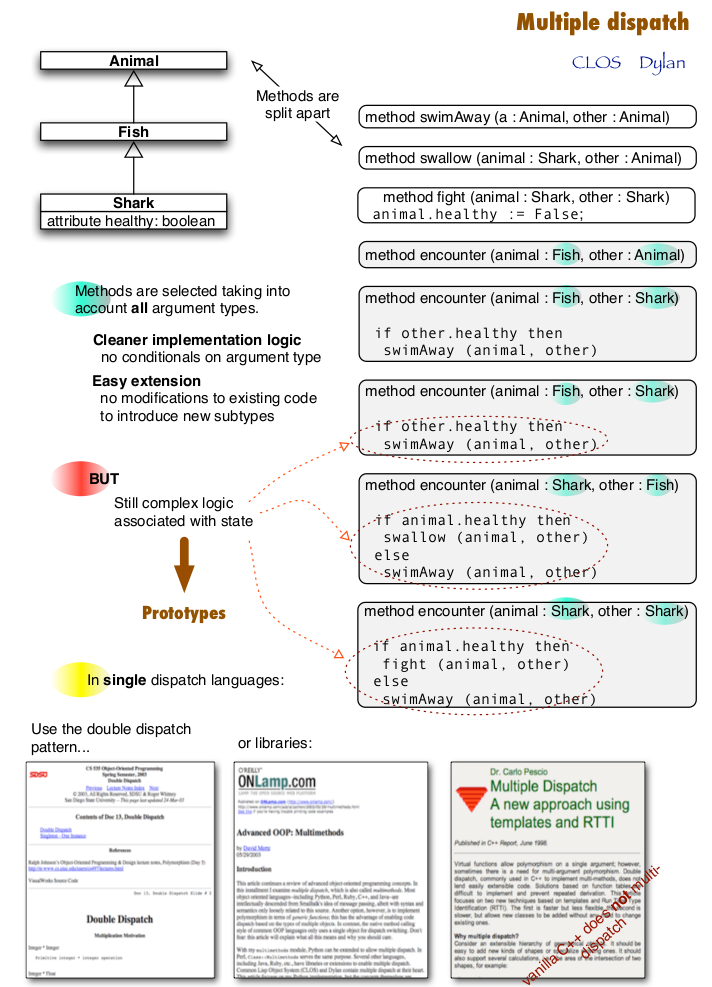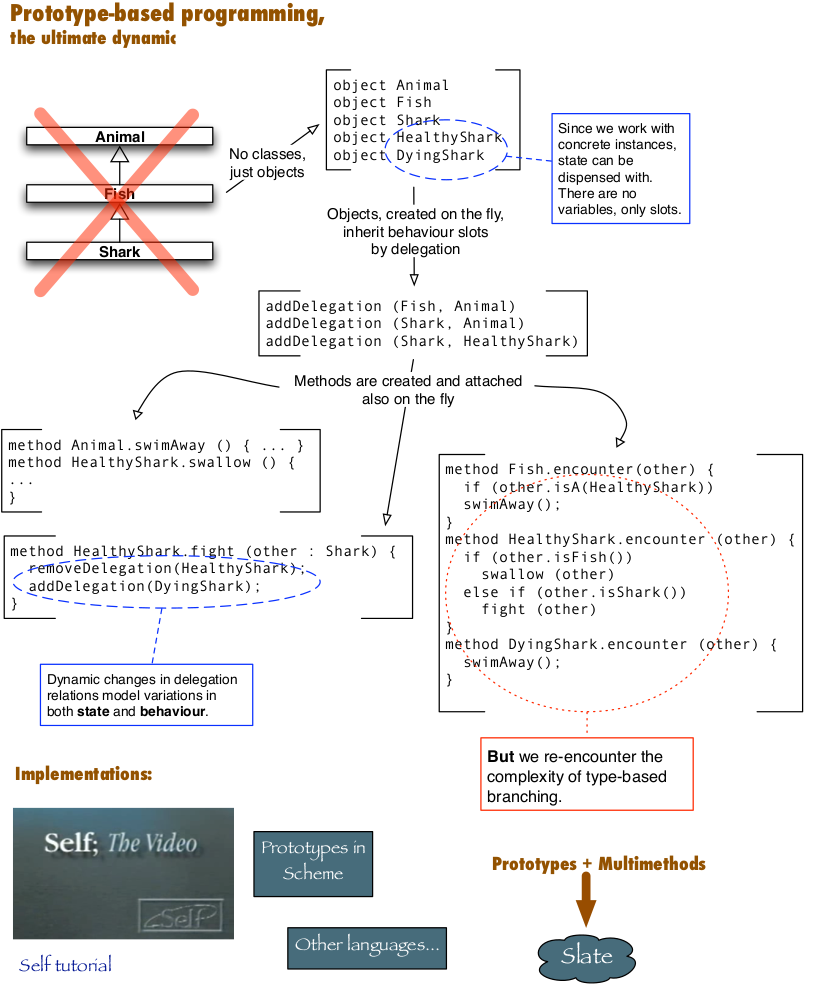beyond mainstream object-oriented programming
Introduction
After a few scheming years, i had come to view objects as little more than poor-man closures. Rolling a simple (or not so simple) object system in scheme is almost a textbook exercise. Once you've got statically scoped, first-order procedures, you don't need no built-in objects. That said, it is not that object-oriented programming is not useful; at least in my case, i find myself often implementing applications in terms of a collection of procedures acting on requisite data structures. But, if we restrict ourselves to single-dispatch object oriented languages, i saw little reason to use any of them instead of my beloved Scheme.
Things started to change recently due to my discovering the pleasures of Smalltalk. First and foremost, it offers a truly empowering integrated ambient to live and develop in. Second, if you're going to use objects, using the simplest, cleanest syntax will not hurt. Add to that some reading on the beautiful design principles underlying Smalltalk, and one begins to wonder if closures aren't, in fact, poor-man objects–or at least i do, whenever i fall in an object-oriented mood (i guess i'm yet not ready to reach satori).
But Scheme is not precisely an ugly or bad designed language, so i needed some other reason to switch language gears for my OO programming. I knew there's more than encapsulation or subtype polymorphism in object-land from my readings on CLOS (the Common Lisp Object System), or on Haskell's type classes (and its built-in parametric polymorphism), but i was after something retaining Smalltalk's elegance. And then i remembered that, when i was a regular lurker in the Tunes project's mailing lists and IRC channel, a couple of smart guys were implementing an OO language whose syntax was smalltalkish. That language (which, if memory servers, started life with the fun name who me?) has evolved during the last few years into a quite usable programming environment named Slate, started by Lee Salzman and currently developed and maintained by Brian Rice.
I've been reading about Slate during the last few days, and decided to learn it. What motivated me was discovering how Slate goes beyond mainstream object-oriented programming by incorporating well-known (but hardly used) and really powerful paradigms. In short, Slate improves Smalltalk's single-dispatch model by introducing and combining two apparently incompatible technologies: multiple dispatch and prototype-based programming. To understand the whys and hows of Slate, there's hardly a better way than reading Lee Salzman's Prototypes with Multiple Dispatch. The following discussion is, basically, an elaboration of Lee's explanation on the limitations of mainstream OO languages, and how to avoid them with the aid of PMD.
Note: the images are thumbnails of this PDF file, with clickable links inside.
Fishes and sharks
Let's start by showing why on earth would you need anything beyond Smalltalk's object system (or any of its modern copycats). Consider a simple oceanographic ecosystem analyser, which deals with (aquatic) Animals, Fishes and Sharks. These are excellent candidates for class definitions, related by inheritance. Moreover, we are after modeling those beasts' behaviours and, in particular, their reactions when they encounter each other: each time a Shark meets a Fish of other species, the Shark will swallow the other Fish, while when a Shark meets Shark they will fight. As a result of such fighting, Sharks get unhealthy, which regrettably complicates matters: wound sharks won't try to eat other fishes, and will swim away other sharks instead of fighting them. The image on the left provides a sketchy representation of the code we need to model our zoo. Waters are quickly getting muddled implementation-wise.

On the one hand, subtype polymorphism based just on the object receiving the encounter message: we need, in addition, to take into account the argument's concrete type to implement the desired behaviour. This is a well-known issue in single-dispatch languages, whose cure is, of course, going to multiple dispatching (see below). In particular, we want to avoid the need to modify existing classes whenever our hierarchy is extended.
On the second hand, varying state (exemplified here by the Shark's isHealthy instance variable complicates the implementation logic. As we will see, prototype-based languages offer a way to factor out this additional complexity.
Beyond single-dispatch
The need to adjust behaviour on the basis of the type of both a message receiver and its arguments arises frequently in practice. So frequently, that a standard way of dealing with it has been christened as the Visitor design pattern. The technique, also known as double-dispatch, is well known: you can see, for instance, how it's applied to arithmetic expressions in Smalltalk, or read about a generic implementation of multimethods in Python (which also includes a basically language-independent discussion on the issues at hand). If you happen to be a C++ programmer, you may be tempted to think that global functions and overloading solve the problem in that language. Well, think twice: a proper implementation of multiple dispatch in C++ needs of RTTI and templates, as shown in this article.

CLOS and Dylan are two examples of languages solving the issue from the onset by including support for multi-methods. The idea is to separate methods from classes (which only contain data slots). As shown in the pseudo-code of the accompanying figure, methods are defined as independent functions with the same name, but differing in their arguments' types (in CLOS, a set of such methods is called a generic function). When a generic function is called, the system selects the actual method to be invoked using the types of all the arguments used in the invocation. The encounter generic function in our running example provides a typical example, as shown in the figure on the right. The benefits of having multi-methods at our disposal are apparent: the code is simpler and, notably, adding new behaviours and classes to the system does not need modifications of existing code. For instance, we can introduce a Piranha, which eats unhealthy sharks instead of swimming away from them, by defining the requisite class and methods, without any modification whatsoever to the already defined ones.
On the downside, we have still to deal with the complications associated with internal state. Enter the magic world of prototype-based systems.
The ultimate dynamic
If you like dynamic languages, chances are you'll find prototype-based system an almost perfect development environment. Prototype-based languages emerged as an evolution of Smalltalk with the invention of Self by David Ungar and Randall B. Smith during the late eighties. The key idea behind Self is noticing that, most of the time, class definitions needlessly coerce and complicate your object model.
A class definition becomes a contract to be satisfied by any instance, and it is all too easy to miss future or particular needs of your objects (class-based inheritance is just a partial solution to this problem, as shown, for instance, by the so-called fragile base class problem). But, if you look around you, objects change in internal behaviour and data content continously, and our attempts at distilling their Platonic nature are often in vain.
In prototype-based programming, instead of providing a plan for constructing objects, you simply clone existing instances and modify their behaviour by directly changing the new instance's slots (which provide uniform access to methods and state). New clones contain a pointer to their parent, from which they inherit non-modified slots: there is no way to access state other than via messages sent to instances, which simplifies tackling with state.
Class-based languages oblige you to keep two relationships in mind to characterize object instances: the "is-a" relationship of the object with its class, and the "kind-of" relationship of that class with its parent. In self, inheritance (or behaviour delegation) is the only one needed. As you can see, Self is all about making working with objects as simple as possible. No wonder Ungar and Smith's seminal paper was titled Self: The Power of Simplicity. Needless to say, a must read.

The figure above shows how our running example would look in selfish pseudo-code. As promised, state is no longer surfacing in our method implementation's logic. Unfortunately, we have lost the benefits of multi-methods in the process. But fear not, for, as we will see, you can eat your cake and have it too. Instead of pseudo-code, you can use Self itself, provided you are the happy owner of a Mac or a Sun workstation. Or you can spend 20 fun minutes seeing the Self video, which features the graphical environment accompanying the system. Like Smalltalk, Self provides you with a computing environment where objects are created, by cloning, and interact with you. The system is as organic and incremental as one can possibly get.
Of course, you're not limited to Self. For instance, Ken Dickey fleshed up Norman Adams' saying that objects are poor man closure's by offering a prototype-based object system in Scheme, and, more recently, Neil Van Dyke has released Protobj. And you have probably already used a very popular language in the family: Javascript. The list goes on, albeit, unfortunately, many of these languages lack either Self's nice integrated environment, or a portable, up-to-date implementation. Slate to the rescue.
The best of both worlds
Prototyping and multiple dispatch are, at first sight, at odds. After all, method dispatching based on arguments' type needs, well, a type for each argument, doesn't it? As it happens, Lee Salzman and Brian Rice have envisioned a way of combining the power of both paradigms into Slate. In fact, proving how this is possible is the crux of Lee's article. In addition, Slate aims at providing a complete development environment in the vein of Smalltalk or Self. Too good to be true? In future installments of this blog category, we'll see how and why it's true, but, if you cannot wait, just run-not-walk to Slate's site. You'll have a great time.
